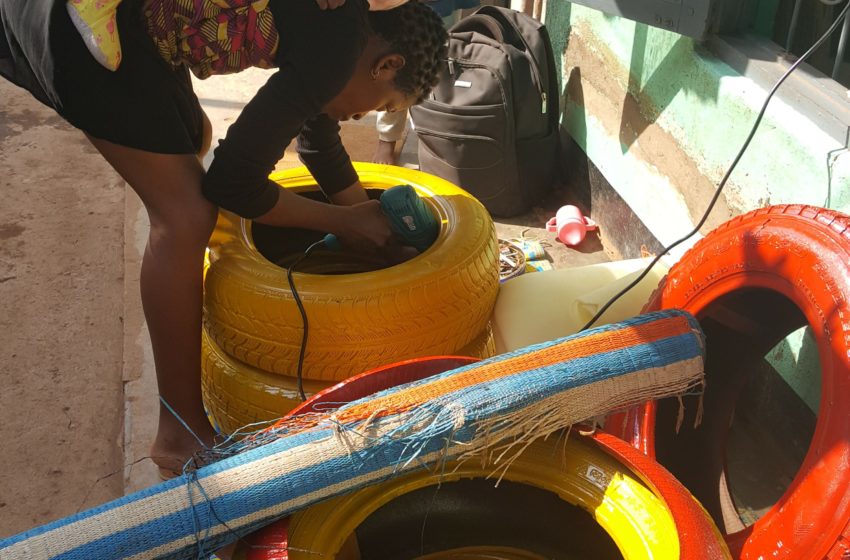
Household Furniture made from Scrap Tyres. Photo/Cynthia/Wanchia/ African Women in Media (AWiM)Bamenda
In most towns and cities in Cameroon, piles of scrap tyres are a common sight. These tyres are routinely dumped on the streets, abandoned in running streams, piled up in landfills or regularly burnt in open places. Residents or companies dealing with used tyres often burn them at night for lack of a safer method of disposal. Environmental experts have pointed out several times that scrap tyres sitting in the sun release methane gas into the air leading to pollution.
The huge amount of solid waste generated from tyres according to the United Nations Environment Programme (UNEP) represents a major problem. It hurts the environment in terms of air, water and soil pollution as no major strategy has been put in place to properly dispose of solid waste like scrap tyres.
In response to the environmental problems and health hazards posed by the disposal of used tyres, most industrialised countries have put in place a legal framework to tackle waste management.
Cameroon’s 1996 law on environmental management isn’t effectively implemented. The law in Article 42 states, “Waste shall be treated in an ecologically rational manner to eliminate or curb their harmful effects on human health, natural resources, the fauna and flora, and on the quality of the environment in general.” Articles 77-85 highlight sanctions to be meted on those found guilty of not respecting the laws put in place but little is being done to put them into force.
Turn used tyre into money
The concept of recycling is yet to effectively gain ground especially when it comes to scrap tyres. This can be attributed to ignorance or lack of knowledge that effective waste management can also contribute to household income. However, 35-years-old Ayeah Leonette is changing this perception. The artist who is also a single mother is one of those who found an opportunity to convert scrap tyres to household furniture used within her home city of Bamenda, in the Northwest Region of Cameroon.
She started two years ago with this as a business idea before realizing she was fighting environmental degradation through the collection of scrap tyres from running streams, streets or landfills. “I learned shoemaking and bags out of fabrics and my knowledge from this then got incorporated into the transformation of used tyres to household furniture like chairs, stools and tables. For me, it was about sustaining myself and my son as a single mum but then I realised it was keeping the environment clean. My products are being used in homes, bars, restaurants and offices,” she says.
“Due to lack of specific dumpsites for these scrap tyres, I collect them alongside my younger brother from running streams, along the streets or in specific areas operating tyres business and dumpsites. I sometimes get called by those who know what I do, to come to collect scrap tyres while others tell me to buy. When I realised this was contributing to fighting pollution, I felt motivated and knew this is a way of giving back to my community. I worked with a few other women but they were not committed and did not see it as a source of income,” Leonette adds”.
She has so far transformed over 500 used tyres in her living room serving as a workshop for now. It takes 2-3 days to collect the raw materials and assemble and one hour and 30 minutes is used to cover it up. It brings her at least $200 per month depending on the sales.
“I hope to get a working space and showroom where I can train more women like me and in particular youths which would help curb the high unemployment rate in my community while tackling pollution at the same time,” she says.
Health impact of tyre piles
The District Medical Officer in charge of Mbengwi and Ngie Subdivision, Dr Chifen Umaru points out that some diseases like encephalitis and dengue fever have also been reported in the proximity of scrap tyres since they are an ideal breeding ground for mosquitoes and other parasites. In addition, the piles of tyres usually get burned which releases thick black smoke that stays in the atmosphere for long periods. According to Dr Umaru, the smoke contains several toxic pollutants including carbon monoxide, Sulphur dioxide, butadiene and styrene which does not only pose danger to public health but also pollute the environment. Inhaling burning rubber is very harmful as the substances it contains irritate the skin, cause itchy eyes, nose and throat, shortness of breath, headache, nausea and upper respiratory infections with the lungs and airway becoming swollen and blocked. “Longer-term effects could be lung cancer, heart disease and air pollution which have also been associated with heart attacks and strokes,” Dr Umaru adds.
“People must engage in recycling other than sticking to the habit of burning as a means of disposing of solid waste,” he advises.
This advice by the medic falls in line with one of the resolutions taken at the 5th UN Environment Assembly (UNEA) that was held in Nairobi-Kenya in March. The Ministerial Declaration recognised the risk of future pandemics and other health risks if humanity doesn’t overhaul its patterns of interaction with nature by adopting a holistic approach to curb pollution.
The environmental cost of tyre burning/piles
The UNEP’s Revised Technical Guidelines on environmentally sound management of used tyres explain the effects that tyre burning and piles have on the environment ranging from air, water and soil pollution. They are non-biodegradable as their time to decompose is indeterminate. Their composition includes hazardous elements like lead, chromium and other heavy chemicals which act as a threat to health and the environment.
In addition, Environmental Protection Agency EPA points out, “For every million tyres consumed by fire, about 55.000 gallons of runoff oil can pollute the environment unless contained and collected. If uncontained, this runoff can then be carried away by rainwater to local water sources contaminating them”.
Ignorance of law stalling implementation
The Ministry of the Environment, Nature Protection and Sustainable Development (MINEDEP) must ensure that industries use raw materials which do not pollute the environment and can easily be cleared if they do or the impact should be mitigated. Lastly, it ensures that any individual or corporate body which breaks any law regulating the environment should be brought to book. However, this task assigned to MINEDEP is not efficiently executed for several reasons ranging from lack of staff, sufficient training, and lack of finances amongst others. If this institution was effectively carrying out its duties, solid waste like used tyres wouldn’t be found on streets, streams` or pilled in landfills.
Mr Agbor Ebai Maurice, who is the Regional Chief of Service for Information, Sensitization and Document at the NorthWest Delegation of Environment admits the existence of the law but notes many are ignorant of the same. “This solid waste needs to be managed by the local council, if observed, then the waste can be properly managed. The law also talks about people paying to dispose of waste properly. It also states that an individual or company can manage their waste by obtaining an environmental permit from the delegation of the environment. The permit allows one to collect waste from any source but unfortunately many do not have it. It is this permit that also engages the delegation of the environment to do a follow up on their activities,” Mr Agbor explains adding that implementation of the environment law will ensure that there is proper waste management.
He says ignorance of the law by tyre dealers results in the poor disposal of the scrap on streets, streams and dumpsites. “There are waste recyclers within the city of Bamenda who collect these tyres and make use of it for different purposes like farming, gardening, embankment, school playgrounds amongst others which is commendable” he concludes.
The Ministerial Declaration from the 5th UNEA support the establishment of a comprehensive and ambitious science policy on the sound management of chemicals and waste and preventing pollution. It recognizes humanity’s failure to manage chemicals and waste, a threat further aggravated by the Covid-19 pandemic. The agreement to establish an international legally binding agreement to end pollution “is the most significant environmental multilateral deal since the Paris Accord” according to Executive Director of UNEP Inger Anderson.
Borrowing a green leaf as an alternative
A report from Reuters News Agency focuses on a Nigerian, Entrepreneur Ifedolapo Runsewe who has set up a Freetown Waste Management Recycle, an industrial plant dedicated to transforming old tyres. The company transforms old tyres into high-demand goods such as paving bricks and floor tiles. This has proven to be a safe and valuable method of waste management in Nigeria.
She has set up Freetown Waste Management Recycle, an industrial plant dedicated to transforming old tyres into paving bricks, floor tiles and other goods. Freetown started operations in 2020 with just four employees, and growth has been so rapid that the workforce has jumped to 128. So far, more than 100,000 tyres have been recycled into everything from speed bumps to soft paving for playgrounds.
This is a good waste management solution that can be emulated by Cameroonians. More women need to take on this as an entrepreneurship venture and seek partnerships with organisations or create enterprises that can be assisted by the government since it doesn’t work with individuals.
Although the Government of Cameroon has made some strides in waste management, more attention should be paid to recycling since the country hasn’t started producing bio-degradable tyres.
The African Green Stimulus Programme (AGSP) outlines that managing waste in a circular economy pathway will significantly improve how goods and services are produced, reduce waste, create jobs and empower more women.
While the Government of Cameroon still has a long way to go in recycling, environmentalists hope more resources could be injected to encourage more women and youths to get involved which would create employment. Start-ups like Ayeah Leonette could need funding to set up bigger spaces, provide training and have more pick up on this initiative and recycling forms with scrap tyres.
This article is part of the African Women in Media (AWiM) Environmental Journalism Programme
Do you want to republish this article?
Contact janet@africanwomeninmedia.com













